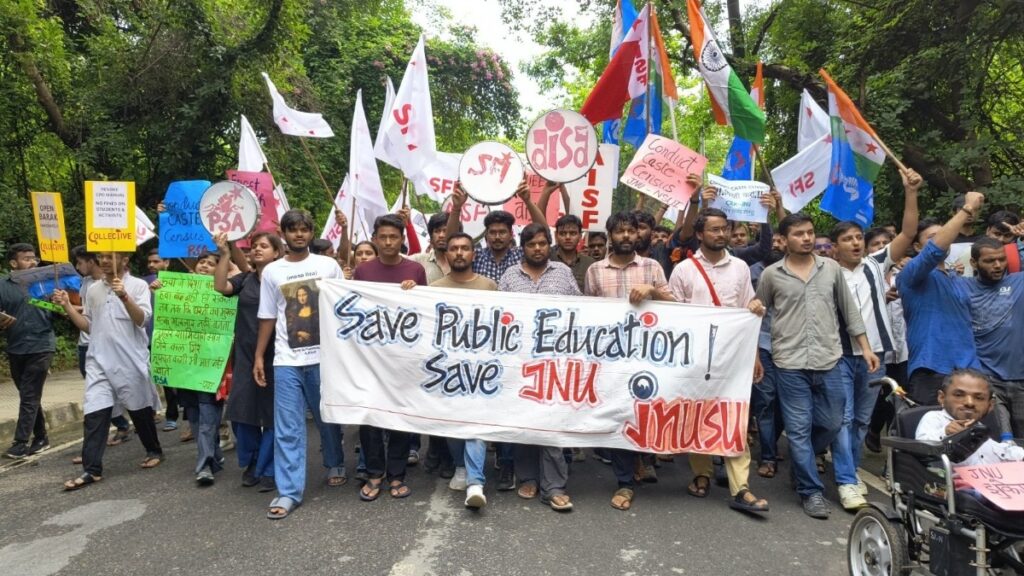After the demand of the student union of Delhi-based Jawaharlal Nehru University (JNU), the administration has decided to conduct caste census in the campus. There was a hunger strike in the campus for 16 days. During this time, the students had demanded that caste census be conducted in the campus. Along with this, the student union had also placed many other demands in front of the university administration. The institute has approved some of the demands of the students and taken a decision. One of the many demands accepted is ‘caste census’, which is important from many perspectives. Now the question arises that what could be the reason behind caste census in the campus. We will try to know why the students raised this demand and if it happens, then how will it prove beneficial for the campus. Before this, let us know which demands of the students the university administration has agreed to.
On which demands of JNUSU did the administration agree?
- The administration has agreed to increase the amount of Merit-cum-Means (MCM) scholarship and also provide scholarships to students of the School of Education and Management Studies if additional funds are received.
- The fine imposed on the students who protested recently will be revoked and the ongoing investigation against the students will be stopped.
- Regular Student Faculty Committee (SFC) elections will be held.
- The university has decided to open the Parthasarathy Rocks Gate from 6 am to 10 pm every day. However, the students’ union has demanded that it be opened 24×7.
- The date of construction of the School of Engineering building was not being released, as to when it would be completed. Now the administration has said that we will get it completed by 26 January, 2026. Apart from this, recognition from AICT (All India Council for Technical Education) is a priority for any engineering college, this college did not have this recognition, after this protest, it got that too.
- A notice was issued demanding a workshop on ‘caste and gender sensitivity’ across the campus and the administration agreed. The students claim, ‘The purpose behind this is to make people aware why using caste-related abuses is bad in society because caste-related abuses are written on the university campus targeting Dalits.’
- Caste census (category census) will be conducted in the campus. The administration has admitted that at present information will be given as per category, how many professors are there on which post, whether SC/ST reservation is being fulfilled among the students or not. Data of professors, students and staff will be provided.
- The student representative was not being called in the Academic Council meeting, now the administration has said that he will be called as per the rules.
- The old in-house entrance exam system – JNU Entrance Exam (JNUEE) will be reinstated. But students claim that it is not yet clear whether it will start from this year.
- The students are demanding that the importance of viva marks should be reduced at the time of entrance and it should be reduced from 30 to 15 marks. At present, 30 marks are awarded in viva. On this, the administration has said that the Nafey committee report will be tabled in the next meeting of the Academic Council, in which a suggestion related to this has been given.
Why did the demand for caste census arise in the campus?
Two weeks after starting an indefinite hunger strike at JNU, the administration agreed to the caste census on Monday, 26 August. JNUSU President Dhananjay told aajtak.in, ‘There are many such posts in the campus which have been declared NFS (Not Found Suitable). Most of these seats are of OBC, SC, ST category. Along with this, the promotions that are happening are also being stopped in a very political manner. Our question is whether the reservation is being fulfilled or not. Along with this, what kind of people are being given the posts of Deans and Wardens.’
He further said that the discrimination based on caste in society is going on, we fear that the same is going on in the university campus as well. This is very important for any university. The caste census will reveal how many professors in the university are from upper castes, which staff is permanent, how many staff come from which society. These questions of ours contain the important motives behind the caste census.
Also read: Admissions in JNU will be done through the old system, caste census will also be done, administration agrees to the demands of the student union
What will be the benefit of caste census?
Students claim that after the caste census, at least there will be less discrimination in the campus. Dhananjay says, ‘When the data comes, the administration is afraid that people will know that we have done wrong. If the data is there, then everyone will know whose right is being violated. Our question is not just whether the reservation has been fulfilled or not, now the question is also that how many people from the reserved category have been able to take admission in the general category.’
Protest started on 11th August, condition of students deteriorated
JNU students started a hunger strike on 11 August to press for their demands. Initially, 16 students went on hunger strike, but seeing the deteriorating health of the protesters, two people joined it – JNU Students’ Union President Dhananjay and councilor Nitish Kumar. Dhananjay’s weight has reportedly decreased by more than five kilograms and he has also complained of jaundice. Nitish Kumar’s weight has decreased by about seven kilograms, and he is complaining of severe joint and muscle pain.
Source (PTI) (NDTV) (HINDUSTANTIMES)
